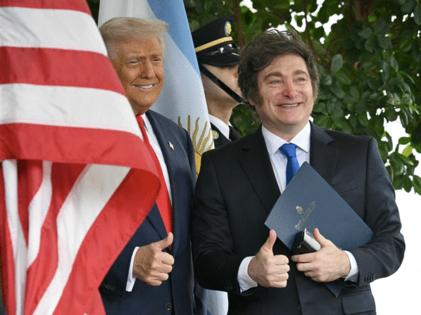Commentary: Donald Trump applies his strongman approach to Latin America
Published in Political News
Other than frustration at surging migration, Latin America has not merited the same level of attention in Washington as the Middle East, Europe or Asia in recent history. That indifference has ended with the second Trump administration, but the nature of our renewed attention is not exactly what many of our neighbors might have hoped for.
Rather than a shared interest in prosperity and stability across the hemisphere, President Donald Trump seems intent on showcasing America’s power to promote his favored autocratic leaders and bring perceived enemies to heel. How these actions promote the interests of American citizens, however, remains unclear.
It feels like a flashback to the Monroe Doctrine, the foreign policy approach introduced by President James Monroe in 1823. He indicated that the United States would not interfere with internal affairs in Europe if European powers stopped meddling in the Western Hemisphere. The message was not exactly anti-colonial, but rather an articulation of spheres of influence, and this hemisphere, Monroe asserted, was for the United States to shape as it pleased.
Trump’s heavy-handed approach to our southern neighbors is built on the same assumption.
In Brazil, Trump has wielded America’s economic power ruthlessly in an effort to thwart accountability for Brazil’s former president, Jair Bolsonaro. In July, Trump imposed some of the highest tariffs in the world — totaling 50% — in retaliation for Bolsonaro’s prosecution for attempting to maintain power through a coup after losing reelection in 2022.
Trump has justified most of his tariffs as necessary to correct trade deficits, which he asserts are unfair. But the United States in fact has a trade surplus with Brazil. Trump made clear in an executive order that this one was specifically for Brazil’s “ political persecution” of his authoritarian ally. Brazil’s current president has thus far refused to cave to the pressure, strongly defending his country’s democratic process and rule of law.
In the Caribbean, Trump’s aggression has come in actual acts of war. Under the guise of a literal war on drugs, the U.S. military has destroyed five boats off the coast of Venezuela, killing 27 civilians to date. The administration has offered no evidence to support its claims that the targeted boats were trafficking narcotics and no legal justification for attacking the boats, even if those claims were true. In a notice to Congress earlier this month, Trump asserted that the United States is in a formal “armed conflict” with drug cartels, so the targets are merely “unlawful combatants.” But his assertion isn’t enough to make those claims legal or true.
Though Trump claims these efforts are to deter drug trafficking, it all appears to be part of a larger campaign to force Venezuelan President Nicolás Maduro from power, which Trump has been trying to do since his first term. Reports indicate that Trump has even secretly authorized the CIA to conduct lethal covert action in the country.
Maduro is a terrible dictator who has destroyed the Venezuelan economy and corruptly clung to power. But that doesn’t make a U.S.-led regime-change war either lawful or sensible.
Trump came to power on a promise of ending wars and not beginning new ones. Using military force to oust a South American leader, in the absence of a clear U.S. interest at stake or exit strategy, seems to clearly run afoul of that promise.
In Argentina, Trump is using America’s financial resources to put a thumb on the scale of upcoming elections in favor of fellow strongman President Javier Milei. Milei came into office almost two years ago promising to slash spending, taking a chainsaw approach that Elon Musk’s Department of Government Efficiency tried to emulate here. But as midterm elections loom, Argentina’s economy is on the brink of collapse again.
The Trump administration offered Milei a$20 billion bailout from U.S. coffers with an additional $20 billion arranged in private-sector loans. Trump’s America First base would probably rather see that invested here at home, since the payout offers no obvious benefit to the American people. It’s also certain to fail. The International Monetary Fund bailed out Argentina to the tune of $20 billion just this April, on top of $43 billion Argentina already owed. It is the organization’s biggest debtor, and that was the 23rd such rescue package in the country’s history. American taxpayers will not see a return on this investment.
Indeed, many U.S. farmers want to know why their taxpayer dollars are being used to help their Argentine competitors secure the very soybean markets that they have lost in China as part of Trump’s trade war. But the bailout will boost several investment firms led by friends of Trump’s Treasury secretary, Scott Bessent, who are heavily invested in the country.
As part of his continent-wide effort to help keep his likeminded allies in power, Trump has made clear that this generosity will continue only if Milei’s party wins the upcoming legislative elections.
Trump may succeed in transforming the continent to a place where governments either favor or fear Trump, but it doesn’t look like that approach will deliver any dividends for the American people.
____
Elizabeth Shackelford is a program director with the Institute for Global Affairs and a foreign affairs columnist for the Chicago Tribune. She also is a distinguished lecturer with the Dickey Center at Dartmouth College. She was previously a U.S. diplomat and is the author of “The Dissent Channel: American Diplomacy in a Dishonest Age.”
___
©2025 Chicago Tribune. Visit at chicagotribune.com. Distributed by Tribune Content Agency, LLC.
























































Comments